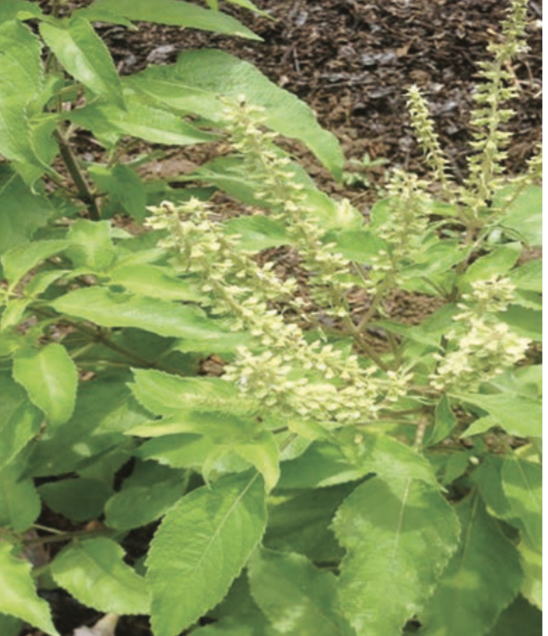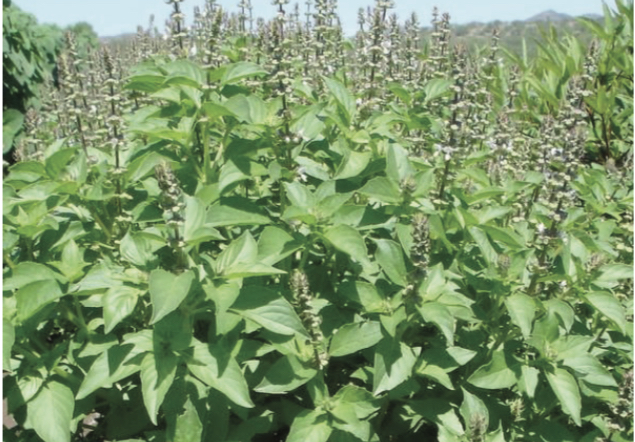FOOD AS MEDICINE – AFRICAN BASIL OCIMUM GRATISSIMUM
Locally called Nchanwu in Igbo, Efirin in Yoruba, Daidoya by the Hausas, Ebe-amwonkho in Edo Ntong in Ibibio, Efik, and Scent leaf, the African basil, Ocimum Graissimum (botanical name) is locally shrub that has consistently found itself in the herbal /spice list of many homes in Nigeria, other African countries and the Caribbeans. It also commonly known by many different names in other climes, for instance, Clove basil, Shrubby basil, Caribbean basil, Zulu basil, fever plan, Mosquito repellant plant, Camphor basil and Hawaiian basil to mention but a few.
Even though it easily grows locally and in other places, the African basil is said to be native to Madagascar, Tropical Africa, India, Southeast Asia, and the Bismarck Archipelago. It is cultivated in many other places like Polynesia, Hawaii, Brazil, Panama, the West Indies, and Mexico (either via the stems or the seeds) as part of home vegetable farming and can also be found in the wild. The growth and maturity usually peak during the rainy season when it blooms with lush leaves and scented aroma. However, the seed tend to mature, dry and ready to germinate during the dry season. The shrub also tends to shrivel and die especially due to lack of water and inclement environment, but if it is watered constantly, it luxuriates and stays the course of the dry season.
Used mainly for culinary purposes as spice especially for sauces and soups, the African basil can be added to every food ranging from bread fruit porridge, yam porridge, Igbo local delicacies like Nkwobi, isi ewu and Ugba if so desired while some nature eaters love adding the leaves and thyme as part of their vegetable salad cocktail For many homes, it is a must as it is believed to have medicinal properties that can induce appetite, aid digestion, and help in the general wellbeing of the family. In some local customs, the leaves are used as preservatives because of its anti-fungal properties especially for fermented cassava and other local fermented food types.
Some families even juice it and give to the whole family as a detoxifier and health occasionally.
Again, the juice is said to be of immense help to diabetics, helps in balancing the cholesterol numbers and that of high blood pressure especially in pregnant women.
Among other health benefits allegedly associated with the plant are regulation of blood sugar, improved hearth health, improved reproductive health, promotion of healthy hair follicles, reduction of inflammation, improved respiratory health especially in the treatment of cough and catarrh and sore. In most traditions the leaves are just plucked and scattered in the room because of its pungent and sweet-scented aroma. The leaves are also squeezed and administered to young children having seizures or convulsions and then placed on the fire as dry steam treatment for such ailments.
It is used as anti-malarial with other leaves like mango, guava, and lemon grass in a herbal tea mix. While growing up, our grandmother used to smoke the leaves over the fireplace thus releasing the powerful smoky aroma that served as mosquito repellent.
Among other nutrients and phytochemicals contained in the African basil are Vitamins A, C, E & K other minerals include iron, calcium, manganese, magnesium, and potassium. All these helps protect the body from free radicals and oxidative damage while the oil from it is said to be able to block the activities of harmful enzymes.
The truth of the matter is that to be able to maximize the benefits , it is adviced to add a handful the leaves in every meal and even brew some for a -get -me-up early morning tea


